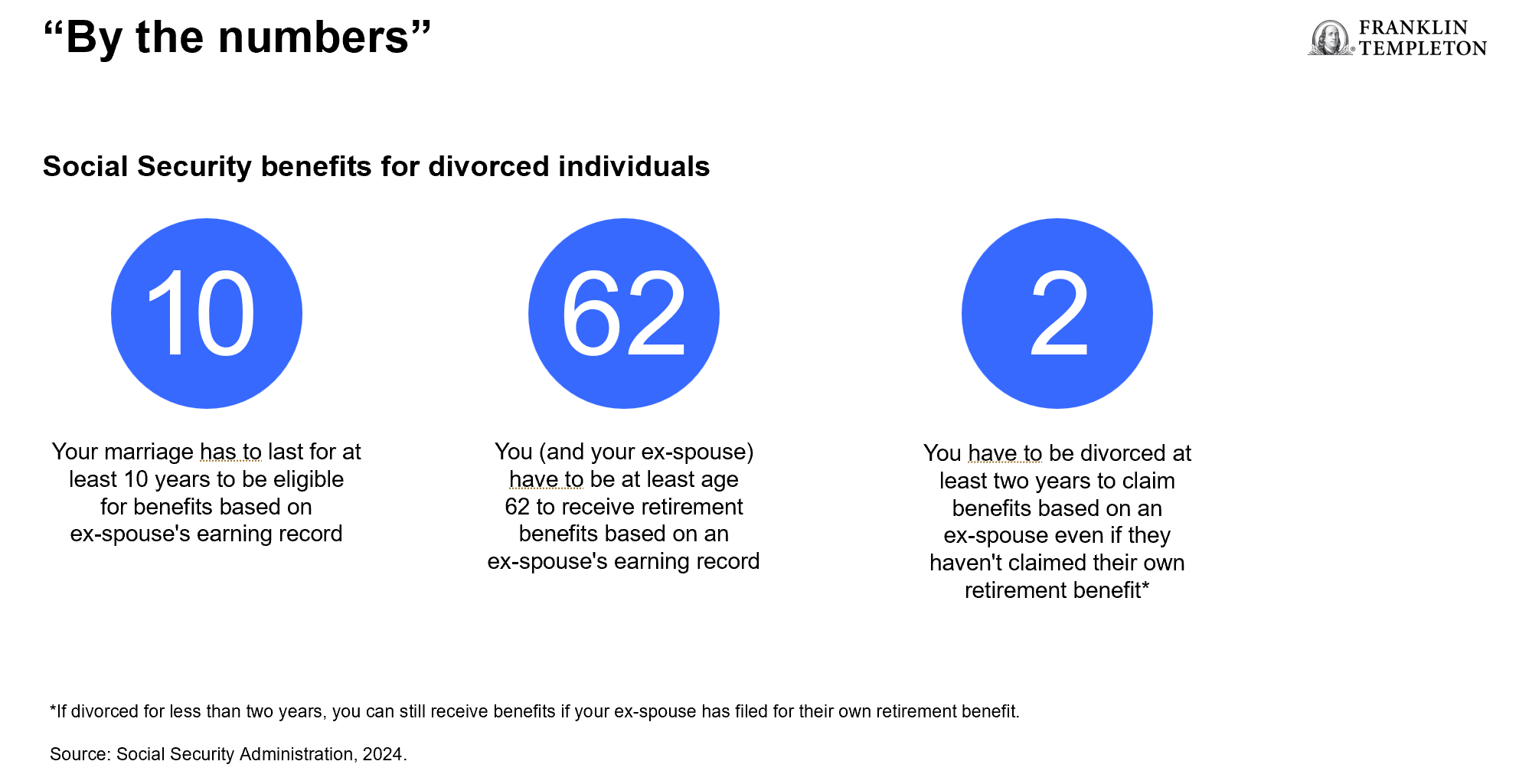Despite a modest decline in the divorce rate over the past decade, more than a half million people get divorced every year, according to the US Census Bureau (2023).
Divorce is a major life change and can be overwhelming, not just emotionally, but also when dealing with issues such as property division, custodial arrangements and, in some cases, spousal support.
This life change also requires attention to financial planning. Individuals need to make sure they do not overlook key issues and considerations related to financial planning around taxes, retirement, estate planning and risk management. It is also important to plan for liquidity and cash management to handle expected expenses from divorce proceedings like legal fees and other unforeseen costs and circumstances.
Financial review
Couples may want to conduct a full financial review prior to—and even after—a divorce, to take into consideration the potential impact on cash flow, taxes, retirement benefits and other sources of income and expenses.
It can also be important to understand how Social Security benefits apply to divorced individuals. If you meet certain requirements, a divorced individual can receive Social Security benefits similar to a married spouse.
Benefits vary depending on age
- Depending on your age when you file for divorced spousal benefits, you could receive as much as 50% of your ex-spouse’s primary insurance amount (PIA), basically the amount of retirement benefits they are eligible to receive at full retirement age (FRA).
- If you file prior to your FRA, the amount you receive will be less. For example, if you claim at age 62, you would receive 32.5% of your ex-spouse’s PIA instead of 50%.
- Even if your ex-spouse claims their own retirement benefit prior to their FRA, it doesn’t mean the benefit you claim based on their earnings record is reduced. For example, if your ex-spouse chooses to receive a reduced benefit by claiming their own retirement benefit at age 62, if you wait until your FRA you would still receive 50% of their PIA (the benefit amount your ex-spouse would have received if they waited until their FRA to claim benefits).
- When you are divorced and file for benefits, the Social Security Administration will determine which calculation will yield a higher benefit. This could be a retirement benefit based on your own working history, or a benefit as a divorced spouse based on your ex-spouse’s earning record.
(Right click to enlarge/open in new window)

The impact of remarriage
If you remarry, you forgo benefits based on your ex-spouse’s earning record (unlike survivor benefits where if you remarry, once you reach age 60 you can still receive survivor benefits based on your deceased spouse).
Other important considerations
- Conceivably, if you were married to more than one individual for at least 10 years, you could have the choice of whose earning record would apply when filing for benefits as an ex-spouse.
- Unlike a regular spousal benefit, a divorced individual does not have to wait until their ex-spouse files for their own retirement benefit before filing and claiming a benefit as an ex-spouse, if the divorce occurred at least two years prior.
- Similar to a spousal benefit, you cannot claim a benefit based on an ex-spouse’s earning record and defer your own benefit. When filing, the SSA will determine which benefit is higher–the benefit based on an ex-spouse or your own retirement benefit based on your earnings history.
- If your ex-spouse dies, then you can begin claiming survivor benefits based on the amount of the Social Security benefit they were receiving prior to passing away. The amount of the survivor benefit received will also depend on whether or not you claim the benefit prior to your FRA. For more details on survivor benefits, see our recent post, “Six things to know about Social Security survivor benefits.”
- If a divorced spouse qualifies for benefits, it will not affect the amount of total benefits a family may receive (known as the family maximum).1
WHAT ARE THE RISKS?
All investments involve risks, including possible loss of principal.
Any information, statement or opinion set forth herein is general in nature, is not directed to or based on the financial situation or needs of any particular investor, and does not constitute, and should not be construed as, investment advice, forecast of future events, a guarantee of future results, or a recommendation with respect to any particular security or investment strategy or type of retirement account. Investors seeking financial advice regarding the appropriateness of investing in any securities or investment strategies should consult their financial professional.
Franklin Templeton, its affiliated companies, and its employees are not in the business of providing tax or legal advice to taxpayers. These materials and any tax-related statements are not intended or written to be used, and cannot be used or relied upon, by any such taxpayer for the purpose of avoiding tax penalties or complying with any applicable tax laws or regulations. Tax-related statements, if any, may have been written in connection with the “promotion or marketing” of the transaction(s) or matter(s) addressed by these materials, to the extent allowed by applicable law. Any such taxpayer should seek advice based on the taxpayer’s particular circumstances from an independent tax advisor.
IMPORTANT LEGAL INFORMATION
This material is intended to be of general interest only and should not be construed as individual investment advice or a recommendation or solicitation to buy, sell or hold any security or to adopt any investment strategy. It does not constitute legal or tax advice. This material may not be reproduced, distributed or published without prior written permission from Franklin Templeton.
The views expressed are those of the investment manager and the comments, opinions and analyses are rendered as at publication date and may change without notice. The underlying assumptions and these views are subject to change based on market and other conditions and may differ from other portfolio managers or of the firm as a whole. The information provided in this material is not intended as a complete analysis of every material fact regarding any country, region or market. There is no assurance that any prediction, projection or forecast on the economy, stock market, bond market or the economic trends of the markets will be realized. The value of investments and the income from them can go down as well as up and you may not get back the full amount that you invested. Past performance is not necessarily indicative nor a guarantee of future performance. All investments involve risks, including possible loss of principal.
Any research and analysis contained in this material has been procured by Franklin Templeton for its own purposes and may be acted upon in that connection and, as such, is provided to you incidentally. Data from third party sources may have been used in the preparation of this material and Franklin Templeton (“FT”) has not independently verified, validated or audited such data. Although information has been obtained from sources that Franklin Templeton believes to be reliable, no guarantee can be given as to its accuracy and such information may be incomplete or condensed and may be subject to change at any time without notice. The mention of any individual securities should neither constitute nor be construed as a recommendation to purchase, hold or sell any securities, and the information provided regarding such individual securities (if any) is not a sufficient basis upon which to make an investment decision. FT accepts no liability whatsoever for any loss arising from use of this information and reliance upon the comments, opinions and analyses in the material is at the sole discretion of the user.
Products, services and information may not be available in all jurisdictions and are offered outside the U.S. by other FT affiliates and/or their distributors as local laws and regulation permits. Please consult your own financial professional or Franklin Templeton institutional contact for further information on availability of products and services in your jurisdiction.
Issued in the U.S. by Franklin Distributors, LLC, One Franklin Parkway, San Mateo, California 94403-1906, (800) DIAL BEN/342-5236, franklintempleton.com – Franklin Distributors, LLC, member FINRA/SIPC, is the principal distributor of Franklin Templeton U.S. registered products, which are not FDIC insured; may lose value; and are not bank guaranteed and are available only in jurisdictions where an offer or solicitation of such products is permitted under applicable laws and regulation.
Please visit www.franklinresources.com to be directed to your local Franklin Templeton website.
____________________
1.For individuals receiving Social Security retirement benefits, other family members such as dependents may also qualify to receive benefits. The Social Security Administration limits the amount of benefits an entire family can receive. Generally, the total amount an entire family can receive is about 150% to 180% of the full retirement benefit of the primary individual.

